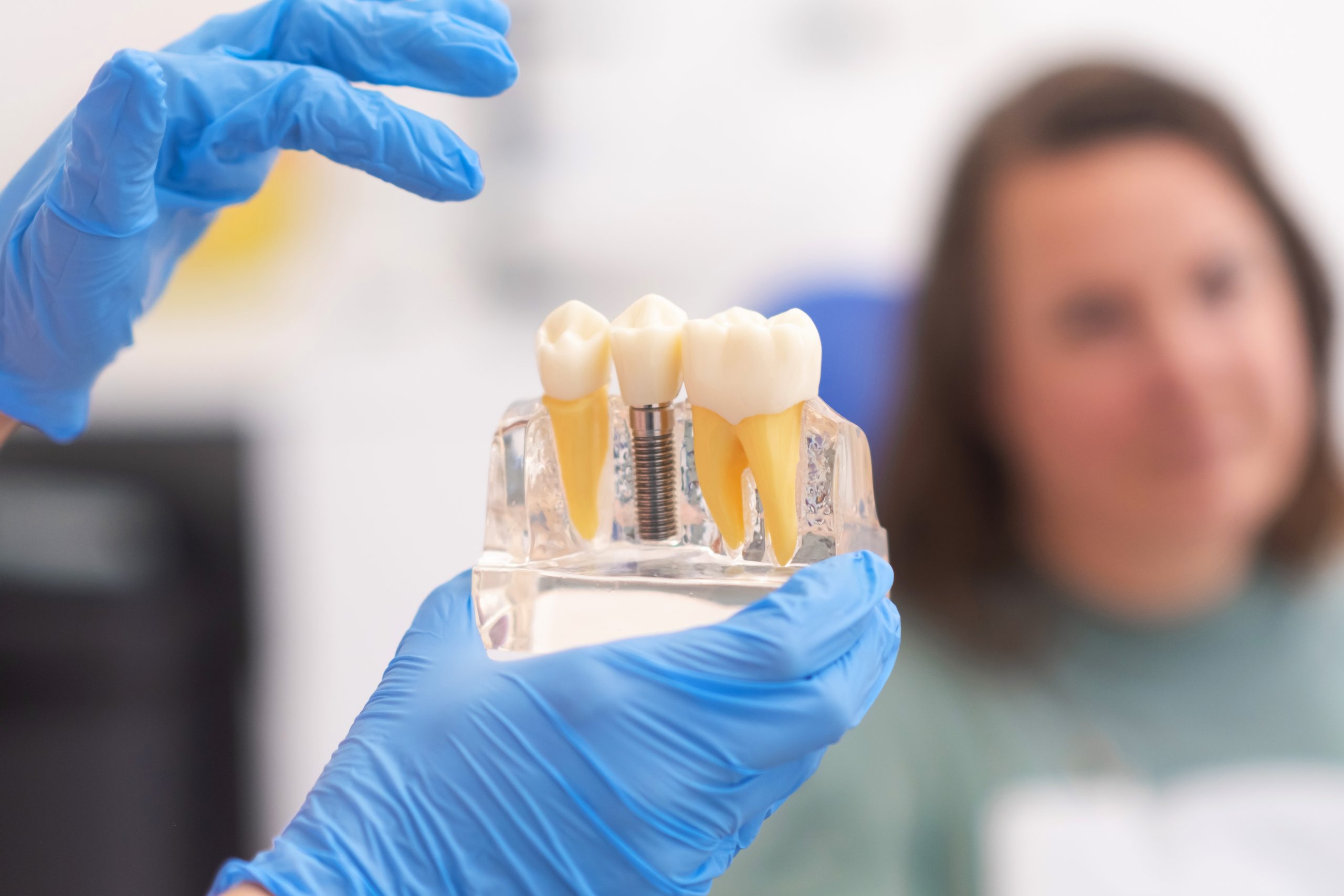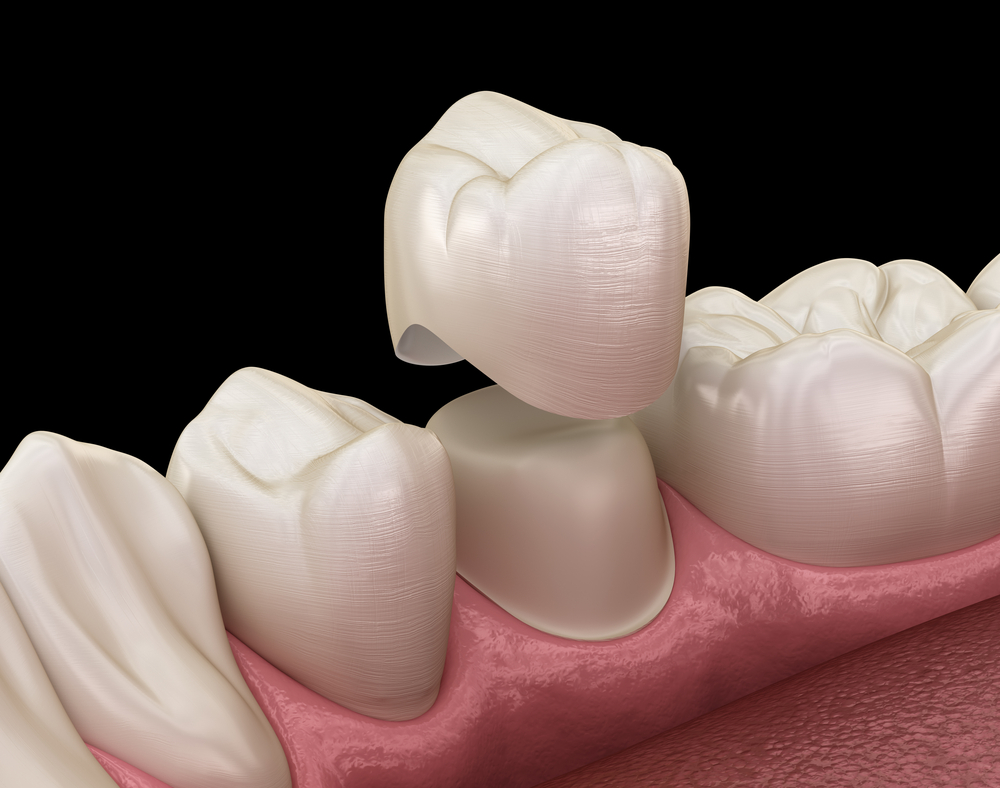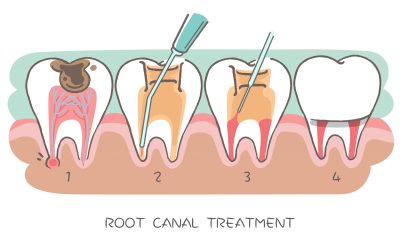You’ve probably heard of dental crowns and/or dental caps. Maybe you’ve confused the two and thought they are different. You’re not alone! Below we’ll dive into the world of dental crowns explaining what they are, the different types, how they compare to implants, and more. But first things first!
Definition: Dental Caps
Dental caps are simply tooth-shaped caps or “covers” that are placed on an existing tooth as a remedy for a decayed tooth, tooth sensitivity, a broken tooth, a weakened tooth, or a worn-out tooth. Dental caps can also be used to cover canal-treated teeth and dental implants. [1]
Dental Crown Vs Cap
Let’s start with a basic question: Are caps different from crowns? NO! Dental caps and dental crowns refer to the same thing. The terms are used interchangeably to mean the same type of dental restoration, with the term cap being a colloquial version (or slang) for a crown.
Crown Versus Implant
Let’s first define dental implants: The term is used to refer to artificial structures inserted into the jawbone by dental surgeons.
- Dental implants can be installed on one/more teeth.
- Dental implants act as anchors for dental crowns.
- They are made of three parts: the implant that goes into the jawbone, abutment, and crown.
- An abutment connects the dental implant to the crown. [2]

Differences Between Dental Crowns and Dental Implants
a. Difference in Components
- Crowns are part of dental implants, they are connected to other parts of a dental implant.
- Implants are made of three parts (a screw/post, abutment, and crown) and replace an entire tooth including the root.
- Dental caps, on the other hand, fit over a natural tooth structure to cover imperfections like discolored tooth, misshapen teeth, chipping, and other dental issues like decay.
b. Difference in Dental Implant & Dental Crown Procedure Time
Regarding treatment time, dental crowns take longer to be installed.
- Patients must undergo dental surgery over several dental visits.
- The treatment includes bone grafting, which is followed by a waiting period of several weeks for the jawbone tissue to heal and grow.
- A hole is then drilled into the jawbone and a titanium post inserted. This also requires a healing period.
- Other procedures include taking impressions of a patient’s teeth to design crowns that match existing teeth in shape and size.
- Dental crowns are installed in minutes in a single session.
c. Difference in Strength and Longevity
While dental implants take longer to install, they come with benefits such as strength and longevity.
Implants are as strong as natural permanent teeth (if not stronger). They are firmly installed into the jawbone and made of highly durable materials.
Implants have a very high success rate and last a lifetime. The same can be said for perfectly installed crowns.
How Long Do Crowns on Teeth Last?
If installation is done well, crowns are a durable option that can last you a lifetime.
d. Difference Based on the Likelihood of Other Dental Problems i.e., risk of Infection
Dental crowns don’t address the root cause of some issues. For instance, while dental crowns won’t decay, the natural teeth underneath can decay which is why crowns must be replaced after several years. Implants don’t decay. They are the closest to a permanent solution for a wide variety of problems, including severe tooth decay and tooth loss.
e. Difference in Cost
Implants will typically cost more than caps or crowns.
Teeth Cap Price: How Much Does a Crown Cost?
Generally, the cost of tooth caps will range from $1,000 to 1,500 based on factors such as the type of material in question. Highly durable materials with great cosmetic appearance cost more. The type will also dictate the cost. Other factors include where they are installed.
Crown For Broken Tooth: Is a Crown a Good Solution for a Broken Tooth?
It depends! The decision should be dictated by how badly a tooth is broken. In some cases, a broken tooth can be restored without using a dental crown. However, in cases of severe damaged teeth, crowns can be a great solution. All in all, your dentist should be able to decide whether a crown is a good solution or not.
I Have a Broken Dental Cap. What Do I Do?
If you suspect your dental crown is broken, begin by determining if it is indeed the dental crown or the tooth that is broken. In case of a crown fracture, a replacement is highly recommended.
We suggest you visit us immediately to sort out the situation.
What Types of Caps Are Available? Can I Get Metal Caps?
Yes! There are many types of metal caps made from all types of metals from stainless steel to semi-precious metals (i.e., base-metal alloys or gold alloys) and pure gold. We offer a variety of metal caps. Although they are a good solution, their only disadvantage is how they look. Metal caps work perfectly for back teeth since aesthetics isn’t a significant factor with such teeth.
Benefits of Metal Caps
Metallic crowns stand out for specific situations. The most notable include:
- Cheaper: In some cases, metal caps may be cheaper than caps made from other materials.
- Thinner: Metal caps may also be slightly thinner than other materials i.e. porcelain.
- Less preparation: Metal caps also require less tooth preparation compared to when porcelain caps are being installed.
Dental Caps Installation by an Experienced Family Dentist in Toronto
If you wish for a better-looking smile or want to find out more about dental caps and other related dental services, you can schedule an appointment at the Little Green Building or CALL 416-769-8135. Alternatively, you can email us at littlegreenbuilding@gmail.com or visit us in person – 265 Jane Street.
Dr. Paltsev and the entire dental care team are always happy to answer common questions about dental treatments like dental caps, the ideal type of crown for you, and more.
We offer ceramic crowns (porcelain crowns), metal crowns, zirconia crowns, and many other types of dental services i.e., emergency dentistry services, dental bridges, root canal treatment, dental fillings, and other types of cosmetic dentistry services.
References
[1] Cleveland Clinic: https://my.clevelandclinic.org/health/treatments/10923-dental-crowns
[2] MedicalNewsToday: https://www.medicalnewstoday.com/articles/327515#about



